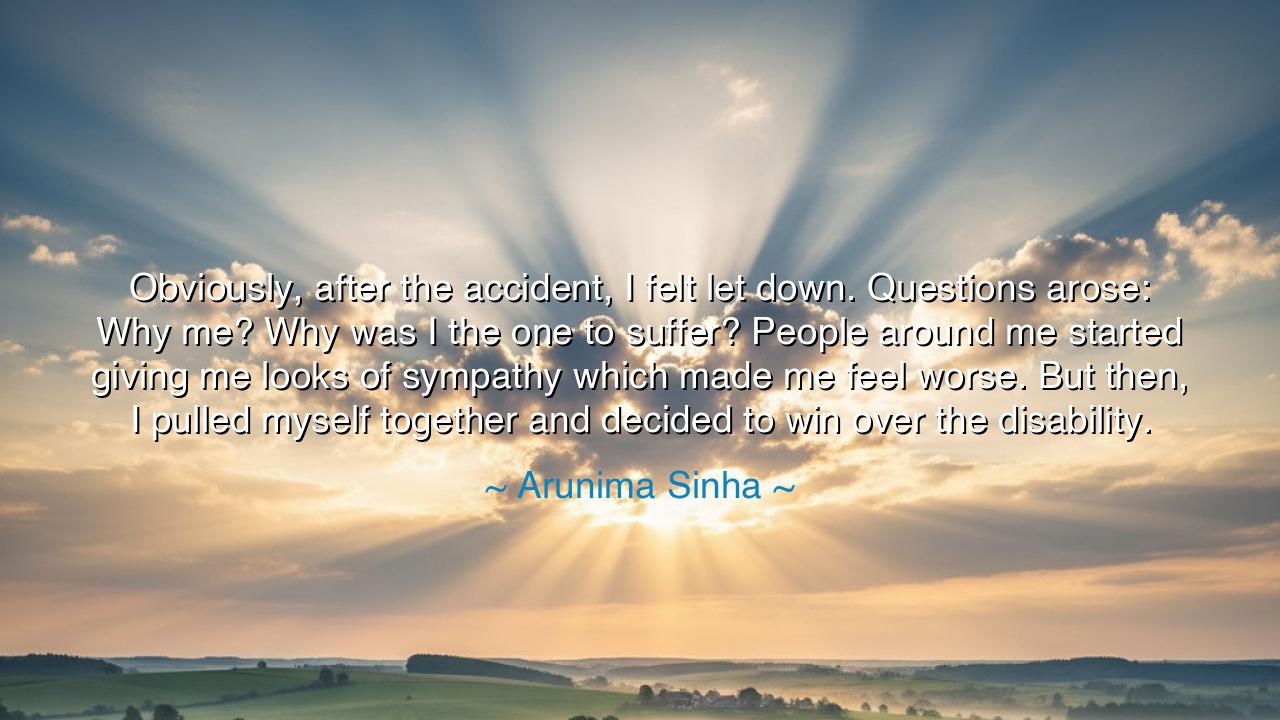
Obviously, after the accident, I felt let down. Questions arose:
Obviously, after the accident, I felt let down. Questions arose: Why me? Why was I the one to suffer? People around me started giving me looks of sympathy which made me feel worse. But then, I pulled myself together and decided to win over the disability.






Hear, O listeners, the voice of Arunima Sinha, whose spirit rose higher than the mountains she later conquered. She declares: “Obviously, after the accident, I felt let down. Questions arose: Why me? Why was I the one to suffer? People around me started giving me looks of sympathy which made me feel worse. But then, I pulled myself together and decided to win over the disability.” In these words lies the eternal struggle of the human soul: the confrontation with pain, despair, and pity—and the rebirth of strength through resilience.
The accident was cruel. Arunima, once a national-level volleyball player, lost her leg after being thrown from a moving train by thieves. In that moment, her life was shattered, and all the dreams she had nurtured seemed lost. Her questions—“Why me? Why must I suffer?”—are the cries of every soul touched by tragedy. They echo the questions of Job in the ancient scriptures, the laments of warriors fallen not by the sword but by fate’s unseen hand. Yet, what matters is not the question itself, but the answer forged through endurance.
For when others cast upon her the weight of sympathy, it was not balm, but burden. Pity can feel like chains, binding a wounded spirit to its pain. What Arunima sought was not to be pitied, but to rise again. And so she turned her face from despair, pulled together the scattered fragments of her will, and set herself upon a path greater than the one fate had stolen from her. With fire in her heart, she chose not to be defeated, but to win over the disability and prove that mountains, not accidents, would define her destiny.
History, too, bears witness to such souls. Recall the story of Homer, the blind poet of Greece, who though bereft of sight, gave vision to generations through the Iliad and Odyssey. Or of Helen Keller, who though denied both sight and sound, became the voice of courage for millions. Like Arunima, they too faced sympathy that could have crushed them, but they refused to remain bound by what was lost. Instead, they rose into a greatness that adversity itself had carved within them.
Arunima went further still. She became the first woman amputee to climb Mount Everest, proving that the highest peaks bow before those who refuse to yield. Her triumph was not over stone and ice, but over despair, over doubt, and over the chains of sympathy. This is the deeper origin of her words: the moment she chose to transform suffering into a weapon, pity into purpose, and disability into strength.
The lesson is clear, O seekers: you cannot always choose what befalls you, but you can always choose your response. When you meet your own crises, do not dwell forever on “Why me?” Instead, ask, “What now? What will I build with the pieces left to me?” Reject pity that diminishes your spirit, and demand respect that honors your courage. For within you lies the power to climb your own Everest, whether it be of body, mind, or circumstance.
So take this wisdom into your life. When the world casts you down, rise. When sympathy is offered in place of respect, refuse to remain small. When your own heart trembles with grief, steady it with purpose. Let your trials become not prisons, but teachers. And like Arunima Sinha, may you one day look upon the heights you have conquered and declare to the generations: I did not surrender to what was taken—I became greater because of it.
Thus remember: adversity will test you, but it cannot define you unless you let it. Pull yourself together. Rise. Conquer. For this is the way of the brave, and the legacy of Arunima Sinha calls upon you to follow.






AAdministratorAdministrator
Welcome, honored guests. Please leave a comment, we will respond soon